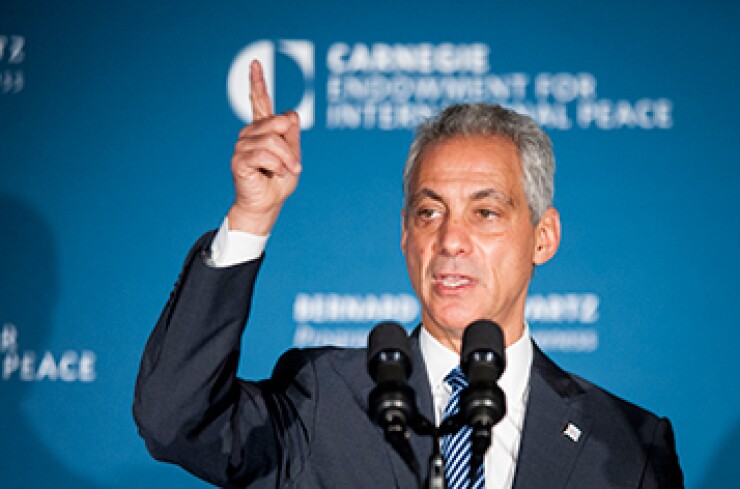CHICAGO – The Chicago Board of Education approved bond authorizations Wednesday that pave the way for up to $900 million of short- and long-term borrowing needed to manage the district’s precarious cash flow.
“No one sitting here feels good about continuing borrowing…but we will do all we can to keep the schools open and this is the options we are left with in the time being,” said board president Frank Clark.
The board of the junk-rated district signed off on $397 million of short-term, state grant-backed borrowing and $215 million of general obligation refunding bonds. The $215 million bolsters existing authority of $285 million on the books, allowing the district to issue up to $500 million of GOs in fiscal 2018.

The $500 million would be structured as general obligation-backed alternate revenue bonds with state aid pledged to repayment. The district traditionally abates the ad valorem property tax pledge that also supports the bonds. Most of the board’s $7 billion of long term bonds use the structure. The $500 million will both refund outstanding debt and reimburse the district for prior obligations.
The board relies heavily on cash flow borrowing to stay afloat and raised the level of tax anticipation note-backed lines last year. It expects to close out fiscal 2017 with $950 million of outstanding TANs that mature in December. It will seek to renew existing authority of $1.55 billion for the coming fiscal year.
Chicago’s chief financial officer, Carole Brown, recently announced the $389 million GAN issue as the solution to the district’s immediate cash flow crisis. The borrowing will provide the cash needed to allow the district to make a $470 million payment on its $733 million fiscal 2017 teachers’ pension payment and keep schools running through the end of the school year next month.
The district will borrow against $467 million it’s owed by the state for its share of block grants for fiscal 2017 which ends June 30. The cash-strapped state has made only one of its quarterly payments and might not make another before the fiscal year ends.
The district had warned that without court intervention or state help schools might close early in June due to Gov. Bruce Rauner’s veto of $215 million in state pension funding help. The district’s lawsuit against the state accusing it of discriminatory funding practices was tossed by a judge April 28.
The board authorization allows the district to seek bidders on the GANs. Terms such as the maturity have not been disclosed. The district has paid in the 3% to 4% range over the last two years for its TAN lines.
On long-term borrowing, the district struggled with market access on its last public offering early last year. The district’s top yield landed at 8.5%, near a state cap of 9%. It was able to capture a lower rate of 7.25% on a $150 million private placement in July with JPMorgan.
The district later pulled the plug on a $426 million GO bond sale due to rising rates after the November election but fared better when it returned with $500 million of A-rated bonds backed by a new capital improvement tax.
Mayor Rahm Emanuel’s administration has said all options, including taxes, are on the table to help the district in fiscal 2018. When pressed Wednesday on his commitment, Emanuel called it foolish to show his hand now as the legislative session winds down to adjournment on May 31.
To lay out a “roadmap” on city solutions “would be the dumbest thing you could do,” Emanuel said after a City Council meeting.
There’s bipartisan support to overhaul school aid formulas and a Senate-passed bill would give the district more pension funding help but it’s uncertain whether the budget impasse and education funding issues will be resolved. Emanuel blamed Rauner for “a void of leadership” on the budget and education funding.
The 50-member city council’s 11-member Progressive Caucus on Wednesday cited CPS funding woes in its introduction of an order demanding the city’s finance team provide a “full accounting” of city reserves, tax-increment financing surplus funds, investment earnings, and other discretionary funds.
“Taxpayers are being asked to underwrite a payday loan for the Emanuel administration as it borrows hundreds of millions at exorbitant interest rates to keep CPS afloat,” Alderman Scott Waguespack said. “If there are funds in these accounts that can be tapped, now is the time to tap them.”
The district is also resurrecting the lawsuit. Cook County Circuit Court Judge Franklin Ulyses Valderrama gave the district 28 days to amend its lawsuit to address his conclusions that the district did not adequately make its case that the state’s aid formulas violated the Illinois Civil Rights Act.
CPS originally filed the complaint in chancery court against Rauner, other state officials and state board of education on Feb. 14 alleging violations of the Illinois Civil Rights Act of 2003. It contends under a fair system it would receive $500 million more annually.
The state countered that CPS last year received more than $252 million more through the block grants than it would have if it received the same funding as all other school districts in the rest of the state.
The amended complaint adds counts under ICRA and seeks to address the judge’s findings that the district did not adequately make its case for that violations had occurred. “We continue to seek a declaratory judgment and a permanent injunction” and “also added a request for damages based on the amount of the disparity in funding,” the district said.





